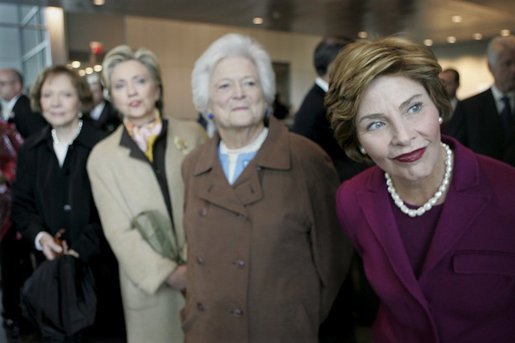Dobbins: America’s most interesting, most influential, and most important First Ladies

White House photo by Eric Draper, Public domain, via Wikimedia Commons
Rosalynn Carter, Hillary Clinton, Barbara Bush, and Laura Bush, four First Ladies of the United States, meet together for an event.
December 18, 2021
For a group of people who marry into their positions, the United States’ First Ladies have historically been fairly influential. Though their role since the first ever presidency has more or less been to host guests in the White House and be a reassuring public figure, many First Ladies have both directly and indirectly impacted America.
I ranked the best of America’s First Ladies based on political influence, personal accomplishments, and character.
10 – Frances Cleveland
At only 21 years old, Frances Cleveland became First Lady after marrying Grover Cleveland, who was nearly three decades her senior. Cleveland quickly became something of a celebrity. From her hairstyle to her clothing choices, everything about Cleveland was loved and replicated by young American women. She was even a covergirl in some publications, and her image was used – without permission – on several different products to increase sales.
Impressively, instead of crumpling at her newfound overwhelming fame, the young Cleveland decided to use her platform to positively impact American women. She held receptions for working-class women at the White House on weekends, and she tried to be a role model for young American women by only drinking at events she hosted. She supported charity organizations for women and people of color. Cleveland also believed in women’s education and rights.
During her husband’s second term as president, Frances Cleveland seemed to be more politically active, going beyond setting an example for American women. She openly supported restoring Queen Liluokalani to the Hawaiian throne.
9 – Jacqueline Kennedy
Style icon and patron of the arts, “Jackie” Kennedy was another First Lady beloved by the American people. Kennedy hosted all kinds of artistic performances at the White House, from Shakespeare to jazz. In addition, she was dedicated to the conservation of historic places in Washington D.C., making plans to restore several of the White House’s public rooms and even striking a plan to demolish Lafayette Square.
While Kennedy was not known for her direct impact on American politics due to her desire to be seen as neutral by the public, she did subtly influence American movements and interests. Kennedy told her husband exactly what she thought of the politicians he was negotiating with, and she forged relationships with other world leaders during her international travels — the most trips of any of her predecessors.
8 – Edith Wilson
Edith Wilson was actually President Woodrow Wilson’s second wife, marrying him at 43 years old while he was in office. She might as well have been destined to become an important figure in American history, considering she was descended from Pocahontas and distantly related to Thomas Jefferson, Martha Washington, Letitia Tyler and the Harrison family.
Wilson was always a relatively influential figure in the White House — she screened her husband’s mail and callers, and President Wilson even shared classified wartime information with her. However, in 1919, her role rose far beyond that of the typical First Lady. After President Wilson had a severe stroke, Edith Wilson misled both Congress and the American public, stating that her husband was only exhausted and in need of rest. In reality, he was left debilitated by the stroke. Edith Wilson required that the Cabinet shared all important matters with her first, and she decided whether or not to share them with the President. Sometimes the Cabinet would receive a response in Edith Wilson’s handwriting — Wilson claimed these were verbatim notes she took from her husband. To this day, historians still are unsure of how much power Edith Wilson held.
7 – Mary Lincoln
Mary Lincoln was a bit like an American Marie Antoinette. No matter how reasonable or unreasonable her actions, she would always be followed by harsh criticism. Lincoln was known for overspending on personal expenses during the Civil War, earning much condemnation from the American populace. Thus, Lincoln found herself in a bit of a paradox. When she spent money on parties and entertaining guests, disparagers accused her of being unpatriotic and too extravagant. When she refused to host parties while mourning her late son, they stated she was neglecting her responsibilities as a hostess. In addition, Lincoln was a southerner, earning the hatred of other southerners who claimed she was betraying her heritage. Meanwhile, northerners were suspicious of her, believing she was at best sympathetic to the Confederacy and at worst a Confederate spy.
However, Lincoln was by no means a bad First Lady. She advised her husband throughout his political career, was a dedicated abolitionist, worked as a nurse in a Union hospital and raised the morale of Union troops throughout the Civil War. If anything, she performed her duties well – many simply chose to focus on what she could be attacked for.
6 – Martha Washington
Martha Washington was the one who started it all. “It” being the First Ladyship, of course. Even before her position, though, she was a powerful woman. Born to an affluent family and marrying into an even richer one, Washington was safely within Virginia’s upper echelon. When her first husband died without much warning, the one and only George Washington quickly began courting her.
During the Revolutionary War, Martha Washington joined her husband at winter encampments, including the infamous Valley Forge. She visited soldiers, donated food and sewed clothing. In addition, she entertained the officers and their wives.
Martha Washington found no joy in being First Lady, but she viewed it as her duty and soldiered through the eight years her husband was president. There is not much evidence suggesting she regularly influenced her husband’s political decisions, but she was well-loved by the American people due to her involvement in the Revolution and inclination to financially support people in need. In fact, Washington was even liked and respected in Europe. Though she was not the most influential First Lady, she was an important figure in America all the same.
5 – Abigail Adams
Abigail Adams was a staunch supporter of American independence. In addition, she also passionately supported the protection of women under the law and women’s education, famously telling her husband John Adams to “remember the ladies.” In general, Adams was an extremely opinionated woman. With no hesitation, she publicly shared her scathing opinions of the anti-Federalists who opposed her husband. Even members of her own political party were not exempt from her verbal attacks – she proclaimed she had “looked into the eyes of the devil himself” after a conversation with fellow Federalist Alexander Hamilton. Most importantly, Abigail Adams was a trusted advisor of her husband, making her one of the more influential First Ladies of the era.
4 – Hillary Clinton
To put it lightly, Americans have always been divided on their opinions of Hillary Clinton. However, her huge impact as both First Lady and as a politician in her own right is undeniable (reminder that Clinton has run for President — twice). Nonetheless, this ranking is based solely on her actions as First Lady.
Almost as soon as President Clinton took office, he named his wife head of the President’s Task Force on Healthcare Reform, where she oversaw research, investigations, financial reports, and more. In addition, Clinton began the Children’s Health Insurance Program in 1997. She also led several efforts to aid children in adoption and foster care. Most importantly, she advised President Clinton on most national matters.
3 – Betty Ford
Betty Ford was such an activist that she tended to irritate her husband’s political party. Most notably, Ford supported the legalization of abortion and the Equal Rights Amendment.
In addition, Ford had no qualms about sharing her experiences with breast cancer and alcohol addiction. During the point in which she was First Lady, most women suffering from breast cancer were expected to be silent about their struggles. After Ford began to raise awareness for the disease, thousands of American women began seeking mammograms. Her desire to raise awareness for health issues was not limited to physical conditions — Ford also highlighted the importance of psychiatric treatment and encouraged individuals suffering from mental problems to seek therapy.
Ford was recognized as an extremely influential feminist and proponent of gender equality, emphasizing that housewives who chose not to work should be equally respected as working women.
2 – Michelle Obama
Throughout her First Ladyship, Michelle Obama was focused on several different issues, advocating for health, service members, and female education.
Obama initiated the “Let’s Move!” program with the goal of decreasing childhood obesity in America. The program worked by giving students healthier meals in school and more opportunities to be active. In addition, she encouraged students to seek higher education and was a passionate proponent of girls’ rights to education internationally.
1 – Eleanor Roosevelt
Even before her tenure as First Lady, Eleanor Roosevelt was active in social movements — specifically, she was part of the reform movements during the Progressive Era.
After becoming First Lady, Roosevelt continued to work as a writer. She wanted to keep the public informed and raise awareness for issues she believed in. Roosevelt held press conferences with dozens of women in attendance, authored novels, wrote a syndicated newspaper column, and hosted a radio show.
Perhaps most importantly, Roosevelt was her husband’s “eyes and ears.” She served as a liaison between the American public and the president during his illness. During this time, she continuously advocated for the rights of women and minorities.
Honorable Mentions
These ladies may not have been the most important, but they were certainly interesting.
Florence Harding
Florence Harding was accused of poisoning President Warren Harding (she didn’t).
Louisa Adams
Louisa Adams hated being First Lady and hated living in Massachusetts, but she liked raising silkworms.
Sarah Polk
Sarah Polk clearly hated fun. She banned dancing, card games, and liquor from the White House during her tenure as First Lady.
Dolley Madison
Dolley Madison saved George Washington’s portrait (and other items) from the White House as Washington was burned during the War of 1812.
Anna Harrison
Anna Harrison actively discouraged her husband’s career as a politician. Looks like she had a point, given President William Harrison died after a single month in office.
Eliza Johnson
Eliza Johnson milked her White House cows every morning, and she didn’t do a whole lot else.









Kellie • Nov 20, 2022 at 4:12 pm
Thanks for the interesting information on the First Ladies. I read a lot about them but I learned a few new things .
Good list and rankings.
Rick Durham • Apr 30, 2022 at 10:58 pm
Thank Christ Melanie Trump did not appear on the list ??
Tammy • Nov 11, 2022 at 8:51 am
really, geez, give it a break
TT • Dec 8, 2022 at 8:54 am
Who is Melanie Trump? First Lady Trump’s name is Melania. Your comment reveals how lackadaisical you are in learning names of great ladies.